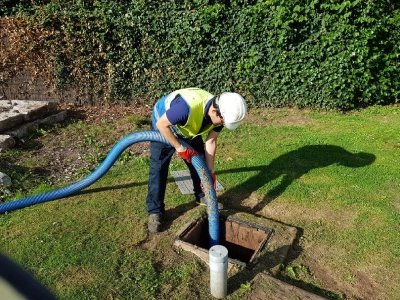Depending on the frequency of usage, you might find it prudent to engage the services of an external contractor to carry out cesspit emptying on a routine basis. Such cesspit services are not only essential for the optimal functioning of the septic tank but also play a pivotal role in safeguarding your health and maintaining proper hygiene standards. The regular emptying of your cesspit is of paramount importance in the ongoing battle against the spread of disease.
Failure to perform this necessary maintenance can result in the accumulation of hazardous pathogens and bacteria within the cesspit. These microorganisms pose a significant health risk to those living in close proximity. Diseases such as typhoid, dysentery, cholera, and gastroenteritis can all emerge as serious threats when cesspits are not properly maintained and emptied at regular intervals.
In light of these potential health hazards, it is crucial to recognise the significance of professional cesspit emptying services. By enlisting the expertise of a qualified contractor, you can ensure the continued functionality of your septic system and contribute to the overall well-being and safety of your household and community. Regular cesspit maintenance is a proactive step in the fight against disease transmission and a crucial aspect of responsible property management.
The accumulation of sewage within a cesspit can give rise to potent and unpleasant odours, creating an uncomfortable environment for both residents and visitors alike. Moreover, this build-up of waste serves as a magnet for various disease-carrying pests such as flies, rodents, insects, and other unwanted creatures. Regularly emptying your cesspit is crucial not only for mitigating the foul smells but also for significantly reducing the risk of pest infestation.
If this build-up is not addressed through prompt cesspit emptying, it can bring about an overflow situation, potentially causing sewage to permeate the surrounding soil and infiltrate groundwater, which poses a serious contamination threat to local water sources, potentially used for essential purposes like drinking, irrigation, and other activities, thereby posing significant risks to human and environmental wellbeing.

It is important to establish a regular schedule for this service as the frequency of emptying can vary depending on factors like the size of the cesspit and the number of occupants in the household. You can understand how often your cesspit should be emptied with regular monitoring, or by contacting a professional who can advise on how a schedule should be planned out to prevent any issues with maintenance and hygiene.
Improperly managed cesspits can contribute to environmental pollution. Releasing untreated sewage into the environment can harm aquatic ecosystems, disrupt natural processes, and damage local plants and animals. There are various regulations and guidelines in place that mandate regular cesspit emptying due to these threats to the environment and public health. The goal is to ensure a clean and healthy living environment for those living near cesspits. Failure to comply with these regulations can result in legal consequences such as penalties and fines. Property owners with cesspits must register with the Environment Agency (EA) in England and consent may be required for certain discharges, especially if the system discharges into a watercourse, groundwater, or other areas that have been flagged as sensitive or protected.
Waste from cesspits must be properly disposed of, as it is illegal to discharge sewage into unauthorised locations. To prevent this, arrangements must be made for the safe collection and disposal of wastewater by licensed waste carriers.
Cesspits are designed to handle a specific amount of waste, but over time, they can degrade due to the corrosive nature of sewage and environmental conditions. Regular emptying helps prevent cesspits from becoming overwhelmed, which could lead to structural damage and leaks, further heightening health and environmental risks. It is important to adhere to local guidelines to protect the surrounding community and maintain cleanliness in the area.

